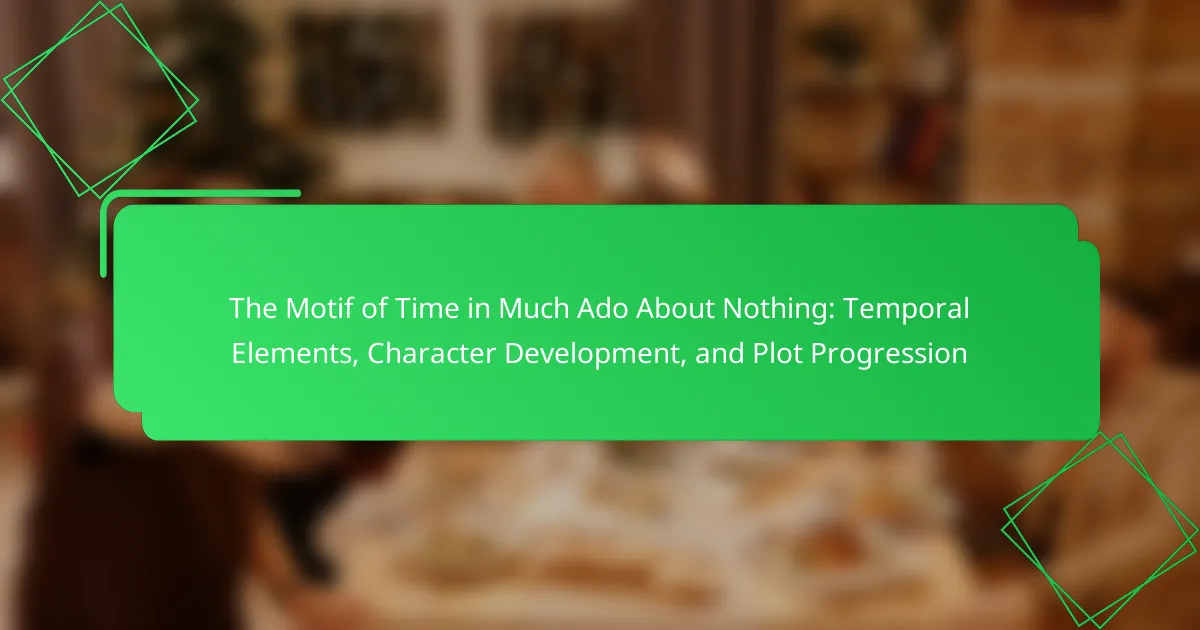
What is the Motif of Time in Much Ado About Nothing?
The motif of time in Much Ado About Nothing emphasizes the themes of timing and its impact on relationships. Characters experience delays and misunderstandings that affect their romantic pursuits. The passage of time influences character development, particularly in the growth of Beatrice and Benedick. Their evolving relationship illustrates how time can change perceptions and feelings. Additionally, the play’s structure reflects the urgency of resolving conflicts before the wedding. The interplay of time creates tension, highlighting the importance of seizing moments. This motif ultimately reveals how timing can shape destiny and personal connections.
How does time influence the narrative structure of Much Ado About Nothing?
Time significantly influences the narrative structure of Much Ado About Nothing by shaping character development and plot progression. The play unfolds over a compressed time frame, creating urgency in relationships and conflicts. This temporal constraint accelerates misunderstandings and reconciliations among characters. For instance, the rapid progression from deception to resolution emphasizes the characters’ emotional responses. Additionally, time serves as a backdrop for the themes of love and honor. The characters’ decisions are often influenced by societal expectations tied to their temporal context. The manipulation of time through events like the masquerade ball heightens dramatic tension. Overall, time acts as a catalyst for both comedic and serious elements in the narrative.
What are the key temporal elements present in the play?
Key temporal elements present in the play include the passage of time, the timing of events, and the concept of memory. The play unfolds over a short period, highlighting the urgency of relationships. Timing significantly affects character interactions, such as misunderstandings and reconciliations. Memory plays a crucial role in shaping characters’ perceptions and decisions. For instance, past grievances influence present actions and relationships. The juxtaposition of past and present emphasizes themes of love and trust. These temporal elements drive the plot and character development throughout the narrative.
How do these temporal elements shape the overall storyline?
Temporal elements shape the overall storyline by influencing character decisions and plot developments. The passage of time affects the relationships between characters. For instance, the delay in Claudio’s recognition of Hero’s fidelity creates tension. Additionally, the rapid progression of events leads to misunderstandings and conflicts. Time also serves as a catalyst for character growth. Characters evolve through their experiences over time, reflecting the consequences of their actions. The manipulation of time highlights themes of love and deception. Overall, temporal elements are crucial for structuring the narrative and enhancing emotional engagement.
Why is the motif of time significant in character development?
The motif of time is significant in character development as it influences characters’ decisions and growth. Time creates a backdrop for transformation, highlighting changes in relationships and personal identities. In “Much Ado About Nothing,” the passage of time affects characters like Benedick and Beatrice, revealing their evolving feelings. The urgency of time also propels the plot forward, impacting decisions that lead to conflict or resolution. For instance, misunderstandings often arise from timing issues, shaping character interactions. Ultimately, time serves as a catalyst for reflection and change, making it a crucial element in character arcs.
How do characters perceive and interact with time throughout the play?
Characters in “Much Ado About Nothing” perceive and interact with time in varied ways. Some characters exhibit a sense of urgency, particularly in matters of love and reputation. For instance, Claudio’s rapid judgment of Hero reflects a hasty approach to time and decision-making. Other characters, like Benedick, show a more relaxed attitude towards time, often engaging in witty banter without concern for immediate consequences.
The passage of time also affects character development. Beatrice and Benedick evolve from playful adversaries to a loving couple, illustrating a maturation process influenced by their experiences over time. Additionally, the theme of deception plays a crucial role in how time is manipulated within the plot. The characters’ interactions with time ultimately drive the narrative forward, leading to resolutions and revelations.
Overall, time serves as a significant motif that shapes character relationships and influences the unfolding of events throughout the play.
What role does time play in the relationships between characters?
Time significantly influences the relationships between characters in “Much Ado About Nothing.” The passage of time shapes character development and emotional connections. Events unfold over a short period, creating urgency in romantic pursuits. Delays and misunderstandings arise due to timing, impacting trust and communication. For instance, the timing of Claudio’s accusations against Hero leads to a crisis in their relationship. Additionally, the contrast between youthful impulsiveness and mature reflection highlights the evolution of relationships. Characters often reflect on past actions, showing how time affects their perceptions and decisions. Ultimately, time serves as a catalyst for growth, conflict, and resolution among the characters.
How does the motif of time affect plot progression?
The motif of time significantly influences plot progression in “Much Ado About Nothing.” Time creates urgency and shapes character decisions. It drives the narrative through events like the impending marriage of Claudio and Hero. The passage of time also highlights misunderstandings, such as the delay in revealing truths. Characters’ development is marked by their responses to time-related pressures. For instance, Benedick and Beatrice evolve as they confront their feelings within a limited timeframe. The manipulation of time, through events like the masquerade, adds layers to the plot. Ultimately, time serves as a catalyst for conflict resolution and character growth.
What are the major plot points influenced by the passage of time?
The major plot points influenced by the passage of time in “Much Ado About Nothing” include the development of relationships and misunderstandings. The timeline of events allows for the evolution of Beatrice and Benedick’s relationship. Their banter transitions into love over the course of the play. Additionally, the delay in revealing the truth about Hero’s fidelity creates tension. This misunderstanding leads to a dramatic confrontation at the wedding. Furthermore, the passage of time allows characters to reflect and grow. Claudio’s eventual realization of his mistake showcases character development. The timing of events ultimately impacts the resolution of conflicts. Each of these points illustrates how time shapes the narrative and character arcs in the play.
How does the manipulation of time create tension and resolution in the play?
The manipulation of time in the play creates tension and resolution through delayed revelations and strategic pacing. Time shifts, such as the use of mistaken identities and eavesdropping, heighten suspense. For example, the delay in revealing Hero’s fidelity creates dramatic tension. The audience is left anxious as misunderstandings unfold. Conversely, the resolution occurs when truths are revealed, restoring order. The timing of these revelations allows characters to confront their conflicts. This interplay of time ultimately drives the plot forward and resolves character arcs.
What connections exist between the motif of time and themes of love and deception?
The motif of time in “Much Ado About Nothing” connects deeply with themes of love and deception. Time influences the development of romantic relationships throughout the play. Delayed actions and misunderstandings create opportunities for deception. For example, Claudio’s quick judgment of Hero leads to a false perception of her fidelity. This reflects how time can warp feelings and decisions. Additionally, the passage of time allows for character growth and reconciliation. Benedick and Beatrice’s evolving relationship showcases the positive effects of time on love. Ultimately, time serves as a catalyst for both deception and the restoration of love in the narrative.
How can understanding the motif of time enhance our interpretation of the play?
Understanding the motif of time enhances our interpretation of the play by revealing character motivations and plot dynamics. Time influences the actions and decisions of characters, shaping their relationships. For instance, the urgency of time affects Claudio’s perception of honor and love. This is evident when he hastily accuses Hero, showing how time pressures can lead to misjudgments. Additionally, the play’s structure reflects the passage of time through its events and resolutions. The timeline of courtship and misunderstandings emphasizes the importance of timing in relationships. By analyzing time, audiences gain insights into character development and thematic depth. This understanding highlights the interplay between time and human behavior throughout the narrative.
What insights can we gain about societal norms through the lens of time in the play?
The play reveals that societal norms evolve over time, reflecting changing values. Characters’ relationships illustrate the impact of time on perceptions of honor and love. For instance, Claudio’s swift judgment of Hero showcases a rigid adherence to societal expectations. As time progresses, the characters reassess their beliefs and actions. The delay in resolving conflicts emphasizes the importance of reflection and growth. This transformation highlights the fluid nature of societal norms. Ultimately, the play suggests that time acts as a catalyst for change in societal values.
What practical applications can be drawn from the motif of time in Much Ado About Nothing?
The motif of time in Much Ado About Nothing emphasizes the importance of timing in relationships and decision-making. Characters often experience misunderstandings due to poor timing, illustrating how crucial it is to act at the right moment. For example, Claudio’s delayed trust in Hero leads to significant conflict. This reflects real-life scenarios where timing affects communication and relationships. Additionally, the passage of time influences character growth, as seen in Benedick and Beatrice’s evolving relationship. Their eventual union demonstrates how time can foster change and understanding. Overall, the motif serves as a reminder of the need for patience and attentiveness in personal interactions.
The main entity of the article is the motif of time in Shakespeare’s “Much Ado About Nothing.” This article explores how temporal elements influence character development, plot progression, and the dynamics of relationships within the play. Key discussions include the impact of timing on misunderstandings, the urgency of events, and the evolution of characters like Beatrice and Benedick. Additionally, the article examines how time serves as a catalyst for both conflict and resolution, highlighting its significance in shaping societal norms and personal interactions. Overall, the exploration of time in the play reveals its critical role in understanding character motivations and thematic depth.


